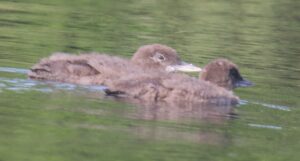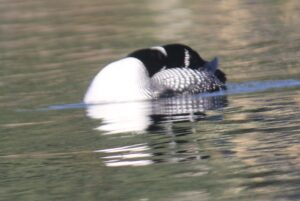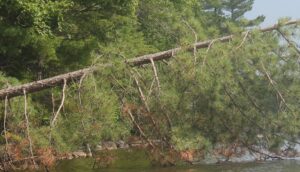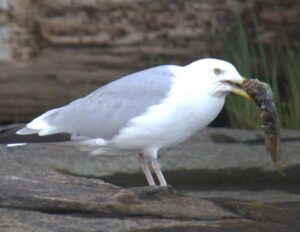TO LEARN, DON’T JUST LOOK
Nature abounds in lessons and metaphors. But they’re subtle, only obvious when we pause long enough to actually see, rather than merely look through lenses clouded by haste or preconceptions.
Time to actually see is one of many advantages of paddling a kayak in the early morning, when there are more animal and bird than human species of neighbours out and about.
This year, several pairs of loons have managed to raise chicks to the point where there’s a better than even chance they’ll make it through to migration time.
 Loons usually only hatch one egg a season. Parenting is a sharded responsibility, and the challenges are myriad. The still fluffy feathers that blend in with the dark water and shoreline indicate the chicks are about seven weeks old, the loon equivalent of teenagers. As with humans, it’s a crucial transition period between total dependence on their parents for food and security, and learning skills they will need to survive on their own. The lesson for us is that loon parents let their offspring learn by trial and error, rather than trying to fulfil their every whim and solve every problem, big or small.
Loons usually only hatch one egg a season. Parenting is a sharded responsibility, and the challenges are myriad. The still fluffy feathers that blend in with the dark water and shoreline indicate the chicks are about seven weeks old, the loon equivalent of teenagers. As with humans, it’s a crucial transition period between total dependence on their parents for food and security, and learning skills they will need to survive on their own. The lesson for us is that loon parents let their offspring learn by trial and error, rather than trying to fulfil their every whim and solve every problem, big or small.
At least one is always drifting nearby, watching. Or in this case, looking for prey. If my kayak and I posed a threat, the peace and quiet would be rent by a yodel, a short, rapid “oo-oo-oo-oo-et”, to tell me to go away.
Instead, the parent issues a single low-pitched “hoop” sound, assuring the chicks they are not alone, and my presence has been noted.
There are so many difficulties and threats in their world that the youngsters must learn to differentiate between the annoying and the potentially fatal, so they don’t waste time and energy needed to go about the endless business of hunting fish.
SURVIVAL ISN”T A GIFT
Life here is measured not by the zero sum standard of “winners” and “losers” a red-hatted leader we won’t sully this piece by naming asininely declaims, but by resistance.

The tree in the photo was knocked down in a storm four or five four years ago.
In spite of having paddled past it a hundred or more times, it took me until now to see it as a metaphor for the dogged determination of millions of people in dire and desperate situations beyond their control, who refuse to give up the struggle to survive.
Too often, their plights are devalued, or treated as an annoyance, something we wish would be out-of-sight-out-of- mind, not intruding on the comfort of the version of the world we want to enjoy.
Gulls fit that category, too.

Often dismissed as raucous disturbers of the peace, their habit of relieving themselves on docks, boat covers, swim platforms and anywhere else inconvenient to humans, has earned them the nickname “Shit Birds”.
Opportunistic scavengers, their diet includes everything from animal and plant matter to carrion and human scraps.
I like to think my fellow cottagers are fastidious when it comes to disposing of garbage.
In more than fifteen years of paddling, I’ve picked up five floating dock bumpers, a few water toys, a hat, a life jacket (with no one in it) and no actual litter beyond a floating can or two and a couple of snack packets, all of which were almost certainly blown rather than thrown off boats and docks. But humans being what they are, maybe we also owe a nod of thanks to scavenging gulls.
IGNORANCE ISN’T BLISS
The flora and fauna that thrive here do so because they have adapted to fit into the realities of the harsher aspects of Nature, rather than doing damage for short term comfort. Perhaps the fact that the stresses, strains and frantic pace modern life afford so few of us the privilege and possibility to learn from Nature, explains (in part) why humans are so hell-bent on running roughshod over it. The latest moves and proposals to scale back regulations on greenhouse gas emissions in the U.S. (which will of course affect the rest of us, gulls and loons included), spit in the face of the scientific consensus on climate change, including U.N. reports seen as the ultimate standard of climate science.
But they are being hailed by auto makers, the fossil fuel industry, as well as libertarians and conservatives who consider the regulations burdensome. That’s in spite of a constant deluged of climate change stories with links to tips such as “how to protect your mental health in the heat.”
A better link would be on ways to clean our lenses, so we can see examples and lessons that should have been obvious in the first place.
Comments are welcomed. Click CONTACT on the site header.
To receive e‑mail alerts to new posts, Click SIGN-UP on the header.
4 thoughts on “TO LEARN, DON’T JUST LOOK”
A refreshing change of pace. Enjoyed the read.
Tks Larry. Have to say I too enjoyed the change of pace.
…breath deeply…relax and welcome the yearly Loon post.
…breath deeply…relax and welcome the yearly Loon post.